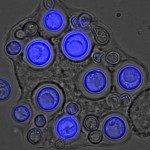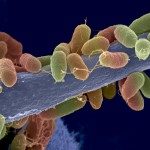Link to Pubmed [PMID] – 22170907
J. Clin. Microbiol. 2012 Mar;50(3):823-30
Early evaluation of treatment efficacy in invasive aspergillosis (IA), a leading cause of morbidity and mortality in hematological patients, remains a challenge. We conducted a prospective study to evaluate the performance of different markers in predicting the outcome of patients with IA. Both clinical and biological criteria were assessed 7, 14, 21, and 45 days after inclusion in the study, and mortality was assessed at day 60. The association between baseline data and their evolution and the day 45 response to treatment was analyzed. A total of 57 patients (4 with proven, 44 with probable, and 9 with possible aspergillosis according to the revised EORTC/MSG [European Organization for Research and Treatment of Cancer/Invasive Fungal Infections Cooperative Group and National Institute of Allergy and Infectious Diseases Mycoses Study Group] definitions) were included. At day 45, 30 patients (53%) were determined to be responders, 25 (44%) were nonresponders, and 2 were not able to be evaluated. Twenty patients died within the 60 days of follow-up. We found that a poor day 45 outcome was associated with patients who had high baseline serum galactomannan (GM) antigen levels and those receiving steroids at the time of IA. A consistently negative serum GM index was associated with a good outcome, and the day 14 clinical evaluation was predictive of the day 45 outcome. No association was found between Aspergillus antibodies or DNA detection and patients’ outcome. We conclude that the GM index value at diagnosis of IA, GM index kinetics, and clinical evaluation at day 14 are good markers for predicting the outcome of patients with IA and should be taken into account for adapting antifungal treatment.



